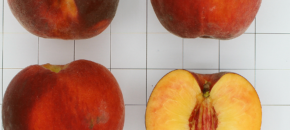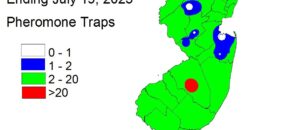Powdery mildew, Alternaria and Cercospora are three important fungal foliar pathogens that can cause early defoliation in carrots, thus reducing yields and making harvest difficult. Each pathogen produces distinct symptoms.
Continue reading...Hackettstown Livestock Auction Results for July 18, 2023
This auction sells: lambs, sheep, goats, calves, beef cattle, pigs, rabbits, and all types of heavy fowl. Auctions are held every Tuesday with the first sale beginning at 10:00 am and ending with the last sale at 5:30 pm. Hay, straw, grain, and firewood are also for sale. Hackettstown Livestock Auction Farm Fresh Eggs available […]
Continue reading...Christmas Tree Pest Notes for July 2023
Cooley Spruce Gall Adelgid (1850-1950 GDD = galls open): Colorado spruce (especially green forms), Sitka and Oriental spruce, and Douglas-fir share this pest’s two host life cycles. Mature adult females lay eggs at the tips of branches. These eggs hatch and the immatures move to new growth and start feeding. The combined feeding and salivary […]
Continue reading...New Peach Varieties – ‘Felicia’, ‘Evelynn’ and ‘Anna Rose’

The Rutgers/NJAES stone fruit breeding program, led by Joe Goffreda, continues to create, and release exciting new peach varieties. We, in collaboration with growers, also continue to develop the varieties by evaluating their performance in plantings in commercial orchards and at Rutgers Agricultural Research and Extension Center. During this key time of the season, historically […]
Continue reading...Controlling Root Knot Nematode in New Jersey
The Root Knot Nematode does show up from time to time in vegetable production in New Jersey. Fortunately, for New Jersey, the distribution and damage done by the Root Knot Nematode is no where near the levels seen in regions further south of the state. There are two species involved, the Northern Root Rot Nematode […]
Continue reading...Vegetable IPM Update 7/19/23

Sweet Corn Fall armyworm (FAW) has begun to appear in coastal areas. We have low level infestations of this pest in whorl stage sweet corn in Monmouth County, and reports of early populations in Cape May, where FAW was a significant problem last season. This pest is capable of significant injury to sweet corn plants, […]
Continue reading...